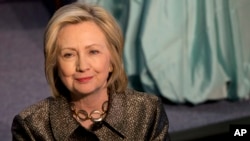The U.S. State Department released online 296 emails of former Secretary of State Hillary Clinton that relate to a 2012 attack on U.S. diplomatic facilities in Benghazi, Libya.
"The documents we make public today were provided to the Select Committee several months ago ... span a two-year period ... and relate to the security of, and attacks on, the State Department facility in Benghazi," State Department spokeswoman Marie Harf said in a statement released Friday morning.
"The emails we release today do not change the essential facts or our understanding of the events before, during, or after the attacks, which have been known since the independent Accountability Review Board report on the Benghazi attacks was released almost two and a half years ago," the statement added.
Release
The State Department is continuing to review the remainder of the 55,000-pages of emails released by Clinton last year, and will make them publicly available on the Department’s Freedom of Information Act (FOIA) website on a rolling basis, the statement said.
The emails have stoked fresh controversy since Clinton, a 2016 Democratic presidential candidate who will be campaigning in New Hampshire Friday, admitted to using a private server and email address during her tenure as secretary of state from 2009 to 2013.
A federal judge had asked the State Department Thursday to present a schedule in the coming days for releasing 300 of the emails related to operations in Benghazi, where four Americans, including the U.S. ambassador, were killed in the attack. The emails have already been turned over to a special House committee investigating the incident.
The New York Times published online Thursday a portion of those emails.
While Clinton's critics are particularly interested in Benghazi emails, several congressional probes have found no "smoking gun" linking her to any failure to protect the Americans who were killed.
Calls for release of emails
Clinton called for the State Department to release the emails as soon as possible.
"Anything that they might do to expedite that process I heartily support," the former first lady and U.S. senator told reporters at a May 19 campaign event in Cedar Falls, Iowa. "I want them out as soon as they can get out."
Clinton, the front-runner for the nomination to represent the Democratic Party in the 2016 presidential election, has come under heavy criticism for a variety of issues: in addition to the personal email account, her charitable work with the Clinton Foundation and paid speeches, and documents that show she endorsed a tax break for nonprofits while solicitations were being sought for the presidential library.
The personal email account she used was hosted on a private server in her New York state home instead of a government one. She has said she used a private account because it was more convenient and points out that she violated no rules.
Clinton deleted from her private account some 30,000 emails that she termed personal, and handed over what she said were work-related ones to the State Department.
"Looking back, it would've been better if I'd simply used a second email account and carried a second phone, but at the time, this didn't seem like an issue," Clinton told reporters at the United Nations in March.
Campaign
Meanwhile, after weeks of small-scale, small-town events with "everyday Americans," Clinton set a date for the first major campaign rally of her 2016 presidential run.
"Get excited: Hillary will be making her official campaign announcement speech at the first big event of her campaign on June 13th," her staff Tweeted Thursday. However, aides did not say where the rally would take place.
Rallies are the cornerstone of American political campaigns, festooned with the button pins, bunting and banners that are quintessential of the campaign trail.
Material for this report came from Reuters, AFP and AP.





